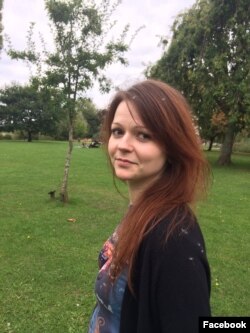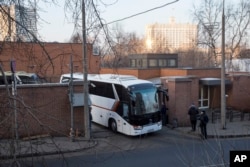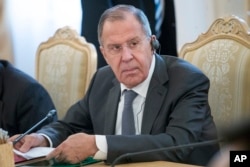The poisoned daughter of a former Russian spy attacked with a nerve agent in Britain says she is recovering quickly.
"I woke up over a week ago now and am glad to say my strength is growing daily," Yulia Skripal said in a statement released Thursday by British police.
Her father, Sergei Skripal, 66, remains in critical condition in a British hospital following the March 4 poisoning Britain has blamed on Russia. The attack on the Skripals set off wide diplomatic recriminations, between the West and Moscow, that were reminiscent of the Cold War standoffs of the 1950s.
Britain, the United States and other NATO countries have expelled more than 150 Russian diplomats in a show of solidarity over the attack. Russia has adamantly denied involvement and expelled an equal number of Western envoys.
On Thursday, three buses believed to be carrying expelled American diplomats left the U.S. embassy in Moscow after their luggage was loaded onto trucks.
In her statement, 33-year-old Yulia Skripal said she was "grateful for the interest in me and for the many messages of goodwill that I have received."
She thanked the people of Salisbury, where the attack occurred, for coming to the aid of her and her father, and the health care workers who have treated both of them.
"I am sure you appreciate that the entire episode is somewhat disorientating," she said, "and I hope that you'll respect my privacy and that of my family during the period of my convalescence."
In Russia, state television released a recording Thursday that it said was of a phone call between Yulia Skripal and a cousin in Russia, in which Skripal said she and her father were recovering and that he had not been irreparably harmed in the attack. The broadcaster said it could not verify the recording's authenticity.
As Russian officials continued to reject British claims that Moscow was behind the attack, Russian Foreign Minister Sergey Lavrov contended that Britain was trying to "demonize" Russia.
"The so-called Skripal case has been used as a fictitious, orchestrated pretext for the unfounded massive expulsions of Russian diplomats not only from the U.S. and Britain but also from a number of other countries who simply had their arms twisted," Lavrov said in Moscow. "We have never seen such an open mockery of the international law, diplomatic ethics and elementary decorum."
Russia has asked for the United Nations Security Council to meet Thursday afternoon on the case. The mission's deputy ambassador, Dmitry Polyanskiy, said in a tweet hours ahead of the session, "We ... have nothing to hide."
Britain's U.N. envoy, Karen Pierce, was asked about the tweet and said she had not seen it, but added, "There is a part of me that's tempted to say, 'Bring it on.'" She said Britain is confident in its position and awaiting results from an independent expert analysis by the Organization for the Prohibition of Chemical Weapons.
Russia on Wednesday called a meeting of the OPCW to demand a joint investigation with Britain into the attack — a demand rejected by the British. The OPCW voted against Russia's proposal.
Margaret Besheer at the United Nations contributed to this report.







